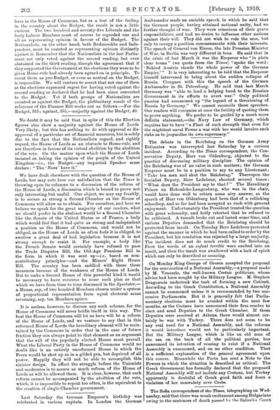We have dealt elsewhere with the question of the House
of Lords, but may note here our satisfaction that the Times is throwing open its columns to a discussion of the reform of- the House of Lords, a discussion which is _bound to prove not only interesting but useful. Our object, we may say frankly, is to secure as strong a Second Chamber as the House of Commons will allow us to obtain. For ourselves, and here we believe we speak for the great majority of our readers, what we should prefer in the abstract would be a Second Chamber like the Senate of the United States or of France, a body which would feel that it bad quite as strong and independent a position as the House of Commons, and would not be obliged, as the House of Lords so often feels it is obliged, to -swallow a great deal of bad legislation because it is not strong enough to resist it. For example, a body like the French Senate would certainly have refused to pass the Trade Disputes Bill, the Old-Age Pensions Bill in the form in which it was sent up—i.e., based on non- contributory principles—and the Miners' Eight Hours Bill. The country has been saddled with these three measures because of the weakness of the House of Lords. But to make a Second House of this powerful kind it would be necessary to have recourse to some such plan as that which we have from time to time discussed in the Spectator,— a House, say, of two hundred Members chosen under a system of proportional representation from equal electoral areas .returning, say, ten Members apiece.










































 Previous page
Previous page